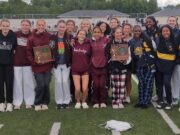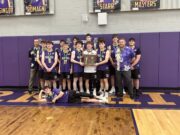Mantua – For those who’ve ever wondered about how Ohio looked back in the 1800s, a trip back in time is as close as Crestwood High School, at least during Frontier Days in May. That’s when students from the American Experience Academy class showcase what they’ve learned all year in a replica of a colonial settlement constructed on school grounds.
If you visit during this annual year-end event, in addition to the handmade log cabin, which is a permanent structure, you’ll find tents for colonists and a native encampment. Depending on the day of your visit, you may encounter a militia practicing drills, or craftsmen and women working with leather or doing metal work. You may come across a display of frontier medicine, or see colonists using pioneer weaponry. You may receive instruction on building a fire using flint and steel. If it’s mealtime, you could experience food cooked over an open fire, or learn how land was surveyed in colonial time. If you’re lucky, you may get to try a game called hunkerhausen, a game of strategy where competitors stand on logs, holding a slack rope between them, trying to steal the rope or be the last one standing. But the yearlong class is much more than fun and games.
Three instructors teach this unique course: History teacher Angus McDougall, Environmental Science teacher Andy Brown, and Language Arts teacher Jami Cutlip. Students learn hands-on skills as well. With instruction from the Ramrod Busters, students pair up to complete the time-consuming and arduous two-three week process of tanning a deer hide. The course also helps students explore the natural world outside, locally across the region at parks and preserves, and through trips to Washington DC, Philadelphia, and colonial sites around Virginia.
Through the course, students learn about the plants and animals from the Ohio frontier that no longer live here, and use Dichotomous keys to identify the plants and animals in today’s environment. A final environmental science project involved determining what tree species would be most effective in heating a 10 X 10 cabin like the replica on school grounds. According to current Academy student Connor Thigpen, teachers provide guidance on each assignment, but “let you figure it out.” For those of you wondering, Thigpen’s research and analysis showed that sugar maple was the ideal wood type.
In the classroom, students read primary sources to research the plants and animals, native culture, and colonial life in order to craft their own character narrative. They read the college-level works of noted historians, to research, and write papers in APA, MLA, and Chicago styles. This comprehensive research helps guide them to create a period-appropriate costume to represent their unique character narratives. “Some students really knock it out of the park,” McDougall beamed, noting that the period-appropriate costumes constructed by several current students would easily fit in seamlessly among the re-enactors in Colonial Williamsburg. An impressive feat, since most students enter the class with no sewing skills to speak of.
Connor Thigpen’s narrative was that of Jeremiah Windsor, who came to the New World with his sister, to be an apprentice to a doctor after the death of their parents in England. His character was among the wealthy settlers; at the start of the school year, students chose life as wealthy settlers, woodsy pioneers, or native Americans to begin their character story. Throughout the year, the Academy welcomes skilled re-enactors from groups like the Ramrod Busters from the Canton area, as well as local craftsmen and women who shared their knowledge on flintlock rifles, metal and leatherwork, colonial cooking, 18th century medicine, Native American crafts and culture. Throughout the course, students work hard, much like the natives and pioneers they hope to portray.
The unique course prepares students for life by giving them the tools and direction on how to learn by doing, helping learning come alive not only for the students and their families, but for bus loads of elementary students from Crestwood, James A Garfield, and Rootstown who visit Frontier Days as a nearby fieldtrip, since the experience includes required course content for elementary students up to fourth grade. For CHS Academy students, the week represents the culmination of a year’s worth of lessons in Environmental Science, English, and of course, History. For the elementary-aged students who visit the frontier settlement they’ve created, this week brings Ohio history to life in a fun and very tangible way.
But the Academy isn’t just for school-age kids. Students from the Academy class recently brought history to life at a local event hosted by the Brimfield Historical Society. The event, called “A Night at the Museum” allowed visitors to rotate through eight stations manned by CHS students and other historical re-enactors dressed as their chosen characters. According to Judi Allen of the Kelso House Museum in Brimfield, “The event’s attendees were impressed by the elaborate detail of the hand-sewn historical impressions as well as the knowledge of the era conveyed. Crestwood students stayed in character while offering information about their station’s focus,” she marveled.
Stations included a ladies tea and dining etiquette. Revolutionary War Lt. Jeremiah Greenman and his wife, who were presented by Bob & Dorothy Hurd of Rootstown, manned another station, while a doctor’s apprentice and midwife from CHS presented another view of colonial life. Other stations included games of the era; weapons and tools, surveying, and bread making. The Ramrod Busters also participated in the evening’s events. “This event gave our students an opportunity to delve into the historically accurate characters they have spent the school year creating,” explained Cutlip. “It also enabled them to share their love of history with the broader Portage County community.”












